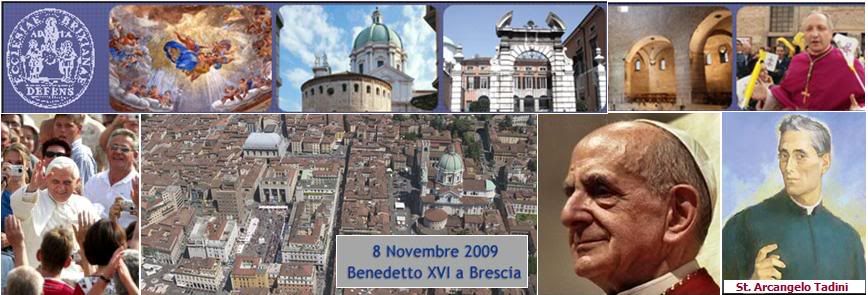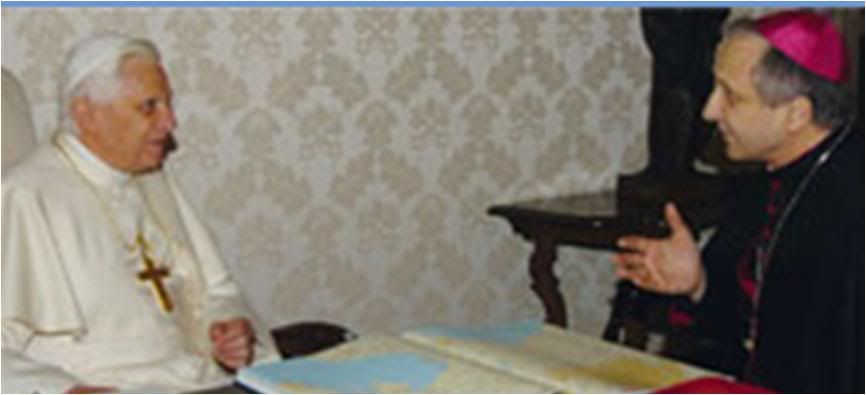
 Earlier stories for 11/7/09 - including many pre-Brescia visit stories - are posted on the preceding page.
Earlier stories for 11/7/09 - including many pre-Brescia visit stories - are posted on the preceding page.


 Benedict XVI fulfills
Benedict XVI fulfills
the dream of Paul VI
by Mons. Luciano Monari
Bishop of Brescia
Translated from
the 11/8/09 issue of


Brescia welcomes the Pope today, For me, as bishop of this place, and for our Church, the arrival of Benedict XVI represents an encounter of grace which is full of multiple significances. To say so, I wish to cite two texts from the New Testament which help to understand them.
The first is that which recounts the visit Peter makes to the centurion Cornelius and his family (cfr Acts 10,24-33). The centurion welcomes him, inviting him to tell them what the Lord had asked him to.
This is the first significance of the Pope's visit. What we expect of the Pope is that he does in Brescia what his mission is, namely, to announce the Gospel.
The fact of hearing this from the voice of Peter has a power and particular meaning for us. The Gospel remains the most important thing, and the Pope is coming to Brescia in its service.
But there is a second passage which illuminates the sense of this November 8 visit, and it is found in Paul's Letter to the Galatians, where Paul recounts his visit to Peter in Jerusalem.
The Apostle writes: "I presented to them the gospel that I preach to the Gentiles - but privately to those of repute - so that I might not be running, or have run, in vain" (Gal 2,2).
The meeting with Peter was a guarantee for Paul that his announcement of the Gospel corresponded to the faith and mission of the whole Church.
In this perspective, the visit of the Pope to Brescia must be seen as a confirmation that what our Church has done and continues to do is right, lived in communion and with and recognized to be authentic by the Bishop of Rome.
But what is this Church that is about to welcome the Pope? The Church of Brescia is rich for its past as well as for its present - for its human resources, with their creative capacity, and their great willingness to work. But it is also rich in the Christian sense, for the presence of many saints, for institutions born for Christian purposes, for a widespread lay commitment that is both organizational and cultural.
Ours is also a Church that knows suffering, which has experienced and continues to experience moments of hard work, and which faces a future with great problems, with important challenges starting with the lack of vocations and how to bring the Gospel within a lifestyle that has become pagan in many aspects.
But we have deep roots to reach into under such circumstances - and among this is the gift that Brescia has given to the Universal Church on Paul VI. Benedict XVI will be here in memory of Papa Montini, and the Church of Brescia is proud to count Paul VI among her sons.
Such pride is also fed by loyalty which is expressed in a series of institutions, and of well-thought-out initiatives to preserve his memory and to have his life and work known.
A worthy undertaking because, as far as I know, Paul VI is perhaps one of the lesser-known Popes, not known enough for his life and for the values that motivated his actions.
The Church of Brescia seeks to safeguard this memory and to make it live on. It is a commitment that at times needs a bit of effort because attention to Paul VI is not a widespread popular movement. And while it is a great movement, it is not yet a general one.
One of the objectives we have is precisely to make this movement popular, because there are extraordinary elements in the life and spirituality of Paul VI that can inspire personal and communitarian growth.
The visit of papa Ratzinger reminds us of this further, in the name of a profound bond between these two Popes, a bond that goes far back. Paul VI always sought, in the years of his Pontificate, the nearness of theologians who could express the reality of Vatican II and therefore, the announcement of the Gospel, to the contemporary world, a world that had changed culturally and become indifferent to the Church.
I believe that by nominating Joseph Ratzinger to be Archbishop of Munich, Paul VI was pursuing this objective. Not all the reference points that he thought he had identified had received satisfactory responses in terms of safeguarding that full fidelity to tradition which Paul VI had always sought to live. And from this point of view, Archbishop Ratzinger corresponded to the expectations of the Pope from Brescia.
In a way, the election of Cardinal Ratzinger to the Papacy brings to fulfillment the dream of Paul VI for an announcement of the Gospel to a society in continual transformation, an announcement faithful to tradition but also capable of meeting the issues and cultural challenges of the day. It is an attitude that Joseph Ratzinger always had and that he carries forward today as the Successor of Peter.
Finally, one might perhaps add that the welcome for the Pope today will be an occasion for Brescia to see him as a person, with his teaching, his vision of man and of life.
Serious dialog with an intelligent man is always fruitful, whether one shares his certainties or not. This Pope has always been in dialog with the contemporary world - a dialog that is sometimes severe, as it must be for those who have strong convictions and seek to live them consistently.
But it is certainly a human dialog that hinges on reason, not on selfish interests, on the confrontation of reasons, not on imposition by force. This in itself is gain enough.
We therefore expect to present the Pope this Sunday with a peaceful day among us. Perhaps we will not be able to show him a perfect image of our Church. But we can show him a lively Church which believes sincerely in the Gospel, which loves the Lord, which seeks to grow by overcoming its fears and its inconsistencies.
And the Pope will help us simply by announcing to us the Gospel of Jesus. To hear this Gospel preached to us by the Successor of Peter will be an experience of comfort and joy, both for what the Pope will tell us, and because we shall see in him, in his presence, the fulfillment of a promise from the Risen Lord: "Behold, I am with you to the end of the world". We can ask for nothing more from this encounter with Pope Benedict.
The affinity between two 'teachers'
in words and gestures
by MARCO RONCALLI
Translated from

Nov. 7, 2009
We alreadty noted it in a Page 1 story in this newspaper on August 6, 2005 (anniversary of Paul VI's death) the special bond that binds Giovanni Battista Montini and Joseph Ratzinger, two intellectuals who came to the Chair of Peter.
Ir explains one of the reasons for the Pope's visit to Brescia and Concesio. Benedict XVI's presence will be rich with significance, that of Benedeict XVI, who is firmly linked to the memory of the Pope who guided the Second Vatican Council and the initial face-off between the Church and the contemporary world.
A memory that 31 years after the Brescian Pope's death, continues to show itself in many ways: sympathy and communion, recognition and affection, convergence of ideas in the exercise of the Petrine ministry, an affinity in framing the dialog with secular culture and in urging greater vitality in Christian witness.
Of course, they have differences, and their styles are different, but the similarities become more evident and more convincing with time - even in their magisterial texts. Just recall in this context Papa RAtzinger's theological rationalism in reinterpreting Montini's teaching, in his revival of
Populorum progressio in the recent
Caritas in veritate.
If it is true, as the Bishop of Brescia has pointed out, that Benedict's visit confirms the path of a local Church that will not turn its back from the transcendental mystery of God, nor close its ears to listing to the Gospel announced with the voice of Peter; and if it is true that Benedict's arrival in Brescia will highlight the patrimony of Christian faith and civic life that the diocese must not only safeguard in memory, but deepen and value even more for their own spiritual growth, then a few facts leap to the eye when comparing the itineraries of Paul VI and Benedict XVI.
How can we forget that it was Papa Montini himself in March 1977 who named Joseph Ratzinger Archbishop of Munich-Freising after the death of Julius Dopfner, and three months after, to make him a cardinal in his last consistory?
How can we forget the appreciation of Paul VI for the work of the young German theologian, first as a consultant at Vatican II, and then as an acute observer of the troubled post-Conciliar years, such that in 1975, he invited him to preach the Lenten spiritual exercises at the Vatican (though the German declined because he felt neither his Italian nor his French were adequate to the task)?
And the telling details that Joseph Ratzinger remembers of his few meetings with the Brescian Pope. Like the ad limina visit of the Bavarian bishops in October 1977, when Papa Montini reminisced about his presence in Munich as a young priest, disoriented at first but soon made to feel at home by so many kind persons. Or the Mass at St. Peter's on Paul VI's 80th birthday, in which the Bavarian cadinal was struck by the Pope's citation of a verse from Canto XXIII of Purgatory in the
Divine Comedy where Dante writes of "that Rome where Christ is Roman" - words that struck Ratzinger because of their symbolic relevance.
Yet another symbol is the series of Patristic texts Sources Chretiennes which will receive the VI International Paul VI Prize from the Istituto Paolo VI in Concesio tomorrow.
In a ceremony at the new headquarters of the Institute, Benedict XVI will hand over the prestigious award to the publishers of the historic series of books emblematic of the mid-20th century rediscovery of early Christian writings.
It is a gesture that also brings back another affinity that goes back a long way. In 1980, then Cardinal Ratzinger, along with Cardinal Paul Poupard, presided over the first of the international colloquia promoted by the Institute - it took place in Rome on October 24-26, on Paul Vi's encyclical
Ecclesiam suam.
[Modificato da TERESA BENEDETTA 08/11/2009 12:40]